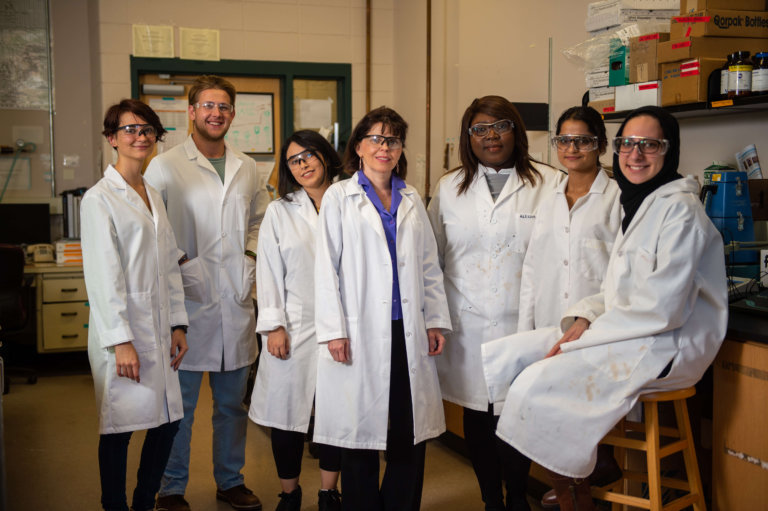
How many man-made objects do you see around you now? The clothes you wear, the straw you drink from, the chair you might be sitting in, the phone you’re reading this from — they form a diverse list that shares one common trait.
Each item contains substances that were discovered by chemists, and eventually designed, developed and refined by chemical engineers. While chemists study matter and substance, chemical engineers find ways to make these substances useful. Pfizer chemical engineer John McKeen was instrumental in the industrial-scale production of penicillin via deep-tank fermentation. Sony engineer Yoshio Nishi led the development of the ubiquitous lithium ion battery which powers practically all our on-the-go gadgetry today. In 2018, Frances Arnold, a professor of chemical engineering, won the Nobel Prize for her pioneering work in the use of directed evolution to design new enzymes. Its applications are as broad as they are essential, from pharmaceuticals to renewable fuels.
The worth of chemical engineering experts is amplified in a time where sustainability is a global concern and the Fourth Industrial Revolution brings upon seismic shifts on the chemical manufacturing industry. How do you get to the forefront of this field? It starts with pursuing an advanced degree at a university with a solid track record in research and education in this growing field. Here are four universities that are helping graduate students develop skill sets that would take them into many different industries.
Inspiring, innovative, and transformative opportunities — these are the experiences master’s and doctoral candidates at the Auburn University Department of Chemical Engineering can expect. Central to this is the Auburn Family, a community of students, researchers and faculty who provide support and collaboration to ensure mutual success.

Source: Auburn University – Department of Chemical Engineering
It’s a feature that makes for exceptional research results and creates a community with the expertise to tackle any problem. Our diverse, engaged, and dynamic faculty are experts in energy systems; biological engineering; systems engineering; and advanced materials and nanotechnology. Together, they embark on collaborative initiatives and breakthroughs. In 2020, our faculty have received substantial awards — from the National Institute of General Medical Sciences (NIGMS) and the US Department of Energy— and developed technologies that reduced the toxicity of MRI contrast agents and fast-tracked a COVID-19 test from development to clinic in less than two weeks.
Successes here are more than a source of inspiration. Our graduate students have front-row seats to the latest discoveries and avenues that expand their opportunities throughout their career. The department offers PhD candidates financially attractive fellowships and assistantships, which include full tuition waivers and stipends. Assistantships are also available for students pursuing an MS thesis. Non-thesis MS students can explore a diverse choice of courses either on campus or through the Auburn University distance education program.
University of Southern California
USC is one of the leading private research universities in the world, with a research community that is young and collaborative. They also have a track record of excellence in research performance.

Source: Shutterstock
The Mork Family Department of Chemical Engineering and Materials Science develops graduates that are well-rounded in engineering education. They meet the needs of industry, academia and government. From conducting pioneering research to taking on leadership roles, its alumni reflect the strength of their multidisciplinary education at USC.
The Mork Family faculty pursues research in diverse fields such as energy, structural and functional materials, reaction engineering, nanotechnology, polymers, bioengineering, and advanced computing. Faculty members have played important roles, looking for solutions in harnessing energy for the 21st century, synthesising novel cell phone phosphors, implantable biomimetics and synthetic cells, and constructing new human therapies.
The department believes that since chemical engineers are employed in virtually all manufacturing industries, chemical engineers must be broadly educated and trained as well as highly adaptable. Located in sunny Los Angeles, California, this university provides extensive opportunities for interdisciplinary studies and collaborations with leading researchers in a city augmented by its geography.
Case Western Reserve University
Case Western Reserve University’s 267-acre campus is located in Cleveland, Ohio, in the heart of University Circle, the city’s most vibrant and energetic community. Case Western believes that an essential element of a student’s education involves research. Hence, the curriculum here is designed in a way that accelerates student development via research. As early as the first year of undergraduate, graduate or professional studies, students are expected to launch their first projects.

Source: Chemical Engineering
One of the school’s most important yearly events, Research ShowCASE, puts student innovation on display for the campus and its partners. Undergraduates are strongly encouraged to get a head-start — there is even an office dedicated to the subject: SOURCE (Support of Undergraduate Research and Creative Endeavors).
At the Case School of Engineering, research in chemical and biomolecular engineering focus on areas such as advanced materials design, synthesis, and processing; advanced separation methods, biotransport and bioprocessing, electrochemical devices, and energy conservation and storage.
The school’s Chemical and Biomolecular Engineering department has twelve full-time faculty members, all of whom lead active research programmes in advanced and emerging areas of chemical and biomolecular engineering.
University of Wisconsin Madison
Since its founding in 1848, this university has been a prolific research institution.

Source: Shutterstock
The Wisconsin Alumni Research Foundation began with a practical problem in 1925 and is now among the oldest and most successful technology transfer offices in the nation. The non-profit remains one of the most successful university technology offices to date with 1,900 university inventions patented and US$1.07 billion contributed to research, programmes and initiatives.
The Office of the Vice Chancellor for Research and Graduate Education addresses the complex challenges of the university’s broad research enterprise. It supports the needs of graduate education, provides strong leadership and spearheads a clear vision throughout the pursuit of research and graduate education excellence. The office respects the profound ways people from all walks of life have something different to contribute. All ideas are accepted in this community; diversity is viewed as a source of strength, creativity, and innovation.
The Department of Chemical and Biological Engineering at UW-Madison has a long tradition of excellence in research and training that dates back to 1905. The emphasis on fundamentals provides students with the solid background they will need in order to succeed. The faculty offers cutting-edge research opportunities in nanotechnology, biotechnology, complex fluids, atomic, molecular, environmental engineering and many more.
*Some of the institutions featured in this article are commercial partners of Study International
Like this? Then you’ll love…
Alabama’s Auburn cheapest city for student housing – study
Chemical engineering degrees: Where talent meets opportunity










